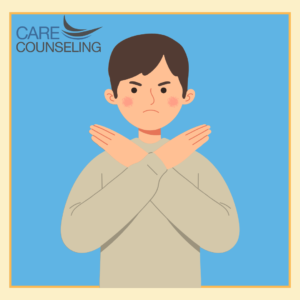 After you have taken some time to understand triggers to anger and the default ways that you typically respond, you can work towards learning new ways to respond. Anger is a valuable emotion. The problem is not anger itself, but often the expression of anger and the damage that it can cause to relationships. Staying calm, taking a pause/ break, and communicating in effective ways are not easy to do when anger is involved! Yet, learning skills such as non-violent communication can help you feel empowered and strengthen the quality of your relationships.
After you have taken some time to understand triggers to anger and the default ways that you typically respond, you can work towards learning new ways to respond. Anger is a valuable emotion. The problem is not anger itself, but often the expression of anger and the damage that it can cause to relationships. Staying calm, taking a pause/ break, and communicating in effective ways are not easy to do when anger is involved! Yet, learning skills such as non-violent communication can help you feel empowered and strengthen the quality of your relationships.
When anger reduces stress, try active-release or relaxing activities.
Active-release strategies can be helpful as an outlet for pent-up angry energy. Examples include physical activities such as working out, going on a run, boxing, or taking a bike ride.
Relaxation activities that slow down the physiological responses in the body such as deep breathing, progressive muscle relaxation, and guided imagery meditation are also helpful.
For ruminating thoughts, try taking a step back as if you are an observer of the thought. Name it and notice it.
When anger masks underlying pain, address what lies beneath the surface.
Take some time to identify the underlying emotions beneath anger. Oftentimes, what you see and what you get can be vastly different. One illustration that demonstrates this nicely is the “anger iceberg”. On the surface, you may see anger, but underneath the surface, there may be pain, suffering, loneliness, anxiety, and fear. Anger is sometimes viewed as a more acceptable emotion in families than expressions of sadness.
When anger seeks to get attention, try building interpersonal relationship skills.
Feeling seen and heard are important aspects of a relationship. If you are not feeling either of the two, try utilizing support from someone you feel safe with and trust to build on interpersonal effectiveness skills. Strategies such as emotional regulation, communication skills, and distress tolerance can be incorporated.
When anger seeks revenge/ punishment, try removing yourself from the situation for a moment.
Once harmful words or physical actions occur, these can’t be taken back and can have significant consequences. Think about the long-term implications. Especially when there is the need for continued contact with someone who has wronged you, revenge only contributes to bitterness and resentment. Being on at least “neutral” ground can help make a big difference when it comes to things like co-parenting and communication. Mediation or a neutral third party may be helpful in these situations.
When anger seeks to change others, try using healthy communication skills.
No one wants to feel forced to change but the transformation is so beautiful when individuals choose to change together within the relationship. Try respectfully communicating your feelings and needs using I-statements. “I feel ____ when _____ and I would like ____.” Healthy communication is key in relationships. Learning these skills individually and together can strengthen your relationships. Perhaps you already have a nice foundation of individual skills and are ready to engage in practicing skills in couples counseling.
Written By: Charlotte Johnson, MA, LPCC
We’re Here to help
Our wellness experts will be happy to take care of you. You can CLICK HERE to schedule an appointment now or call (612)223-8898.
Meet Clinicians
We’re united by our commitment to providing effective, relevant, and innovative mental health support at all stages of your journey. Click Here to find a therapist or find out more about who we are, where we come from, and how we live out CARE’s mission every day.
The professionals at CARE are actively collecting and creating resources to help with what you need and address frequently asked questions. We’re Here for You.



